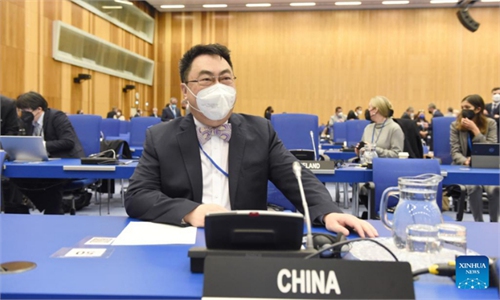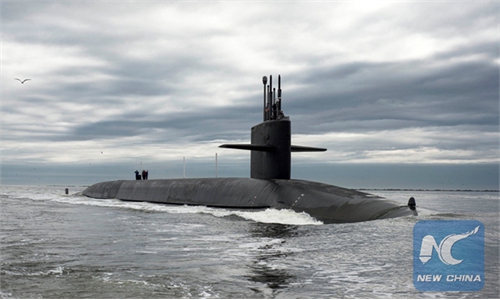IN-DEPTH / IN-DEPTH
Chinese envoy recounts fierce exchanges at IAEA over AUKUS deal, calls nuclear submarine plan a blatant violation of non-proliferation
Called to account
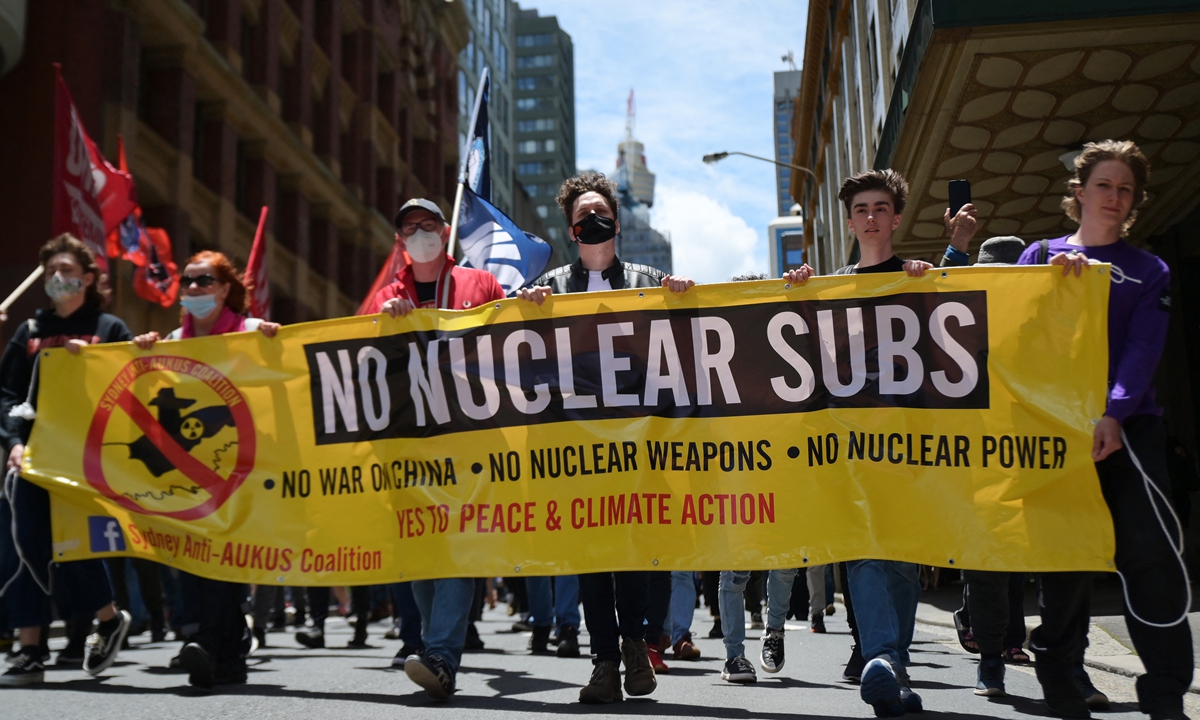
Members of the Sydney Anti-AUKUS Coalition (SAAC) participate in a protest in Sydney, Australia, on December 11, 2021 against the nuclear submarines deal among AUKUS members. Photo: AFP
Editor's Note:
The nuclear-powered submarine deal under AUKUS is a blatant, irresponsible act of nuclear proliferation, and once again proves that AUKUS countries are practicing a "double standard" on nuclear non-proliferation and using the deal as a tool for geopolitical gamesmanship, Ambassador Wang Qun, China's Permanent Representative to the United Nations in Vienna, told the Global Times in an exclusive interview on Monday.
Wang, also China's Chief Negotiator for the Joint Comprehensive Plan of Action (JCPOA), known commonly as the Iran nuclear deal, and former director-general of the Department of Arms Control of the Chinese Foreign Ministry, warned of a serious negative impact brought about by the deal on international efforts to resolve the Korean Peninsula and the Iranian nuclear issues.
In September 2021, the US, the UK, and Australia announced the establishment of AUKUS, under which the US and the UK will assist Australia in acquiring nuclear-powered submarines.
Why Iran has to limit its nuclear enrichment and stockpiles while Australia can receive tons and tons of nuclear-weapon materials from the US and UK, Wang questioned.
Why is this a matter of great concern to international community? What are the serious consequences? What kind of tools did the US, the UK, and Australia use to whitewash their nuclear proliferation? What IAEA rules have they violated? How has China thwarted attempts by these countries to get the International Atomic Energy Agency (IAEA) embroiled into acts of the transfer of nuclear weapon material? You will find detailed answers in this interview.
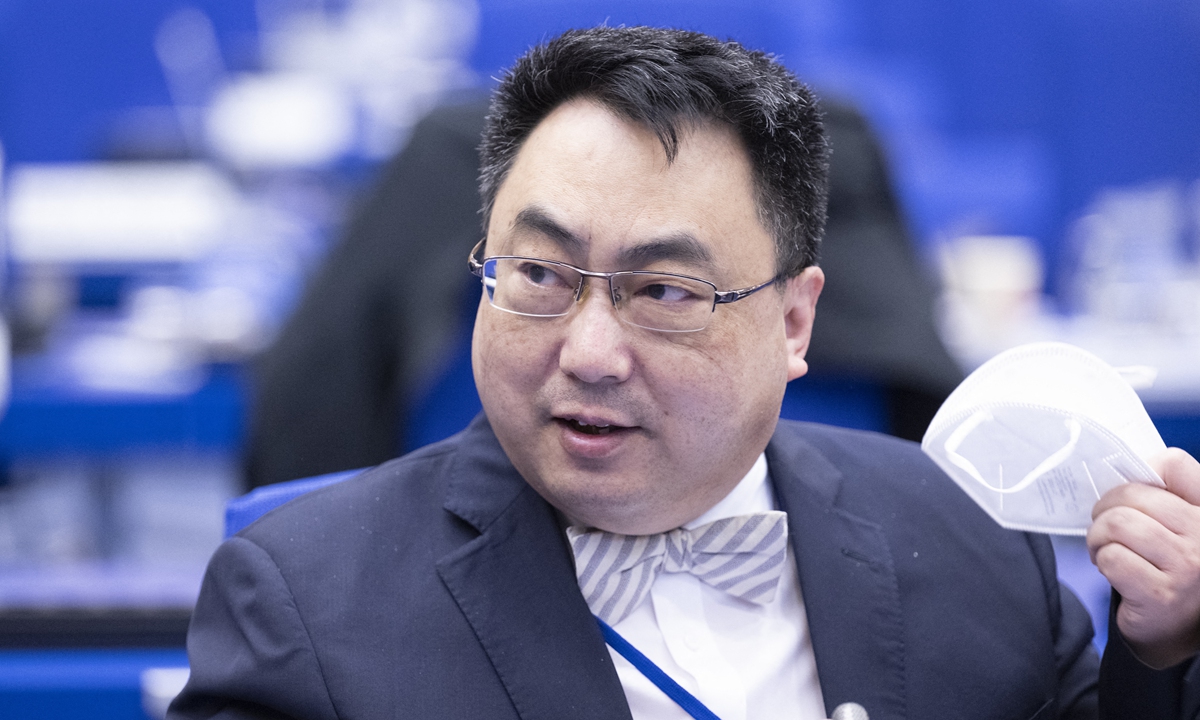
Wang Qun, China's Permanent Representative to the United Nations in Vienna Photo: AFP
GT: At the meeting of the IAEA Board of Governors on September 12, the AUKUS nuclear-powered submarine deal became the focus of attention. Could you talk about the background of the trilateral deal?
Wang: In September 2021, the three countries pronounced their decision of nuclear submarine cooperation under AUKUS. Chinese State Councilor and Foreign Minister Wang Yi clearly pointed out the dangers posed by the three countries to nuclear non-proliferation, regional security, and strategic stability, with resonance from the international community.
Since November 2021, the meetings of the IAEA Board of Governors, on the basis of China's proposal, have decided to include in its agenda "Transfer of the nuclear materials in the context of AUKUS and its safeguards in all aspects under the Non-Proliferation of Nuclear Weapons (NPT)" as a stand-alone item.
The nuclear submarine deal under AUKUS is a blatant act of nuclear proliferation. The export of nuclear weapons-grade material to Australia as a NPT Non-Nuclear-Weapon State by the US and the UK as two Nuclear-Weapon States is extremely irresponsible and once again proves that they are practicing a "double standard" on non-proliferation by using it as a tool for geopolitical gamesmanship.
Such acts will have a serious negative impact on international efforts to resolve hotspot issues such as the Korean Peninsula and Iran nuclear issues.
This also reflects the serious concerns of IAEA members, who believe the matter is beyond the current mandate of the IAEA Secretariat and must be addressed by IAEA members through an intergovernmental process. In other word, member states must have a final say in this matter.
GT: The Chinese delegation's statement on the issue at the board meeting was widely reported by the global media. Could you please explain what rules have been violated as a result of the AUKUS nuclear submarine deal?
Wang: At this board meeting, China listed seven major problems and mistakes of the trilateral deal under AUKUS, which was echoed and supported by a wide range of member states.
Member states believe that these countries' assertion to the effect that nuclear materials that sealed in a reactor cannot be used directly for nuclear weapons misleads public opinion, and is completely untenable.
Australia, in particular, has violated its reporting obligations under the its Comprehensive Safeguards Agreement (CSA) and Additional Protocols (AP). It has failed to submit any substantive report to the Agency as required, in violation of its legal safeguards obligations under its CSA and AP, despite its pronounced decision of the nuclear-powered submarine deal under AUKUS in September 2021.
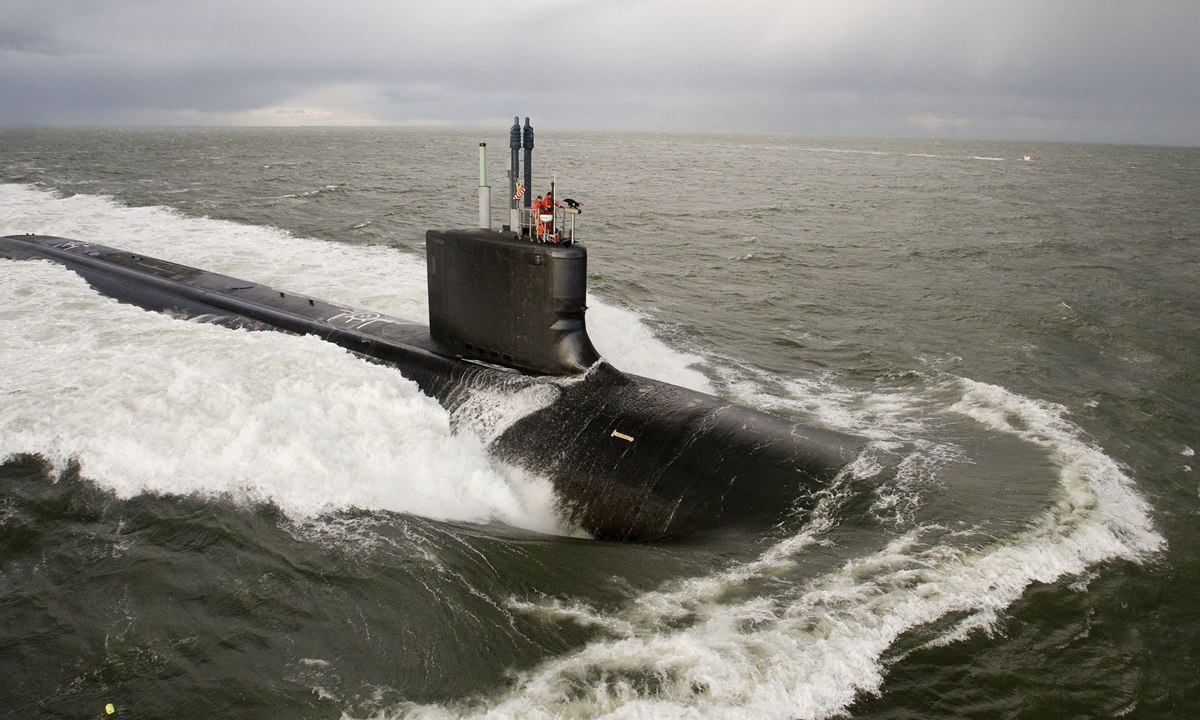
A US Virginia-class attack submarine undergoes Bravo sea trials on November 26, 2009 in the Atlantic Ocean. Some analysts say that the nuclear submarines to be supplied to Australia under AUKUS deal could be modeled on the Virginia-class attack submarine. Photo: AFP
GT: The Chinese delegation has pointed out at the meeting that "the three countries mislead the international community by packaging illegal nuclear proliferation as a legitimate and innocuous act." Can you tell us more about how the three countries misled the international community?
Wang: The item proposed by the three countries at this board meeting is titled "Agency safeguards in the context of naval nuclear propulsion under AUKUS." Two points are worth-noting here. First, they deliberately used "Agency safeguards" as a cover-up effort while not mentioning the NPT treaty at all. Second, they, under the pretext of "naval nuclear propulsion" tried to conceal the true nature of illegal deal as well as the nuclear proliferation impacts.
Through political maneuvering, the three countries attempted to coerce the IAEA Secretariat into proposing a safeguard assessment exempting the nuclear submarine deal under AUKUS, and then force the IAEA Board to adopt it by taking advantage of their vote at the Board, by which, to help legitimize their illegal proliferation.
GT: How did the Chinese delegation thwart AUKUS' attempts which flout the rules?
Wang: As we mentioned, since AUKUS's announcement of the deal in September 2021, on the basis of the China's proposal, the IAEA Board has decided, by consensus, four consecutive times to adopt the question for inclusion in its agenda as a stand-alone item. In its working paper and statement, the Chinese side pointed out in detail the dangers of the trilateral nuclear submarine deal and expressed deep concerns over such dangers, which were echoed by many other member states.
At this board meeting, the three countries, however, tried to eliminate the item China proposed, by pushing the IAEA Director General to set up his agenda item on their terms. But they failed, as the IAEA Director General is reluctant to yield to the three countries' pressure and political maneuvering. At the same time, China's proposal is objective, fair and reasonable, and China also firmly bases itself on the NPT in consistent with the mandate of the Agency, and, as a result, China's item has been widely supported by a wide range of IAEA member states.
Under such circumstances, the three countries could only jump onto the forefront directly by pushing their own item for inclusion in the agenda. What an irony and hypocrisy on the part of the three countries.
GT: Media reported that China and the three countries have had fierce exchanges at the meeting. Could you share some moments at the meeting?
Wang: The debate at the meeting room was intense, but some could also be constructive. I would like to share with you an episode. When the Agency deliberated the meeting agenda on the first day of the meeting, the US, in pushing their agenda items, did not present to the Secretariat its "explanatory memorandum" as required under the Board's rules of procedures. The Chinese delegation could have called out the US' proposal from the meeting agenda, but the Chinese side chose to suspend the meeting for 15 minutes, so as to allow the US delegation to remedy their proposal. Only on this basis, did China pronounced its dissociation from the agenda item proposed by the US.
So, China's approach is upright and constructive, with enormous credits from other member states.
GT: What do you think is the way out for the nuclear submarine deal under AUKUS?
Wang: Multilateral problems must be responded and addressed by multilateral means. The nuclear submarine deal under AUKUS goes beyond the existing mandate and competence of the Secretariat of the IAEA. It is not something that can be addressed bilaterally by the three countries and the Secretariat of the Agency, and must be addressed by the member states of the IAEA.
China calls on the three countries to refrain from moving forward with their cooperation pending the consensus and agreement among the Agency's member states. China also calls on the Secretariat of the Agency, for its part, refrain from proceeding further, in the absence of mandate from member states, to negotiate any safeguard arrangements with the three countries for such a cooperation.
It is the hope of China that the Director General of the Agency will present to the Board fair and objective reports, pursuant to his statutory obligations, on the nuclear submarine deal under AUKUS.
Finally, China wishes to see all member states to continue their intergovernmental process, to explore an agreed formula on the issue of the nuclear submarine deal under AUKUS, so as to safeguard the NPT and the international nuclear non-proliferation regime in promotion of international peace and security.
Sidebar:
How AUKUS nuclear submarine deal breaks the rules and relevant treaties?
The US, the UK and Australia violated their respective obligations under the Non-Proliferation of Nuclear Weapons Treaty (NPT) and relevant protocol with the IAEA while concealing the true nature of the three countries' acts of sheer nuclear proliferation as a result of AUKUS nuclear submarine deal, according to China's Permanent Representative to the United Nations in Vienna.
Specifically:
1. It directly violates Articles I and II of the NPT
2. It breaches the objective set out in the IAEA Statute that no Agency safeguards shall be provided "in such a way as to further any military purpose."
3. The three countries have undermined the non-proliferation functions and integrity of the IAEA by taking the Secretariat hostage to engage in activities prohibited by the Statute.
Source: Chinese Mission to UN in Vienna

